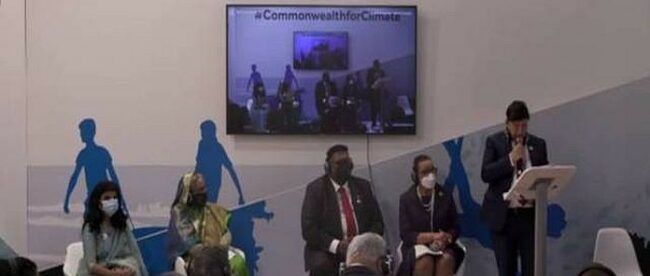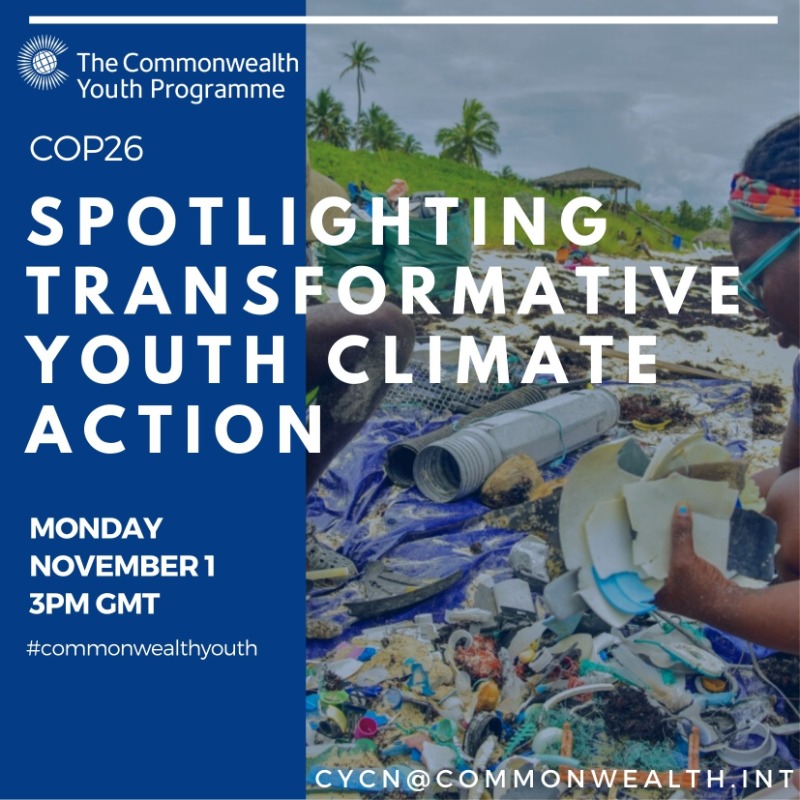The Commonwealth at COP26

The Commonwealth Pavilion at the UN Framework Convention on Climate Change (UNFCCC) Conference of Parties (COP26) in Glasgow was the first of its kind and proved to be an extremely useful platform for showcasing the wide-ranging climate change work across the Commonwealth. It also helped to strengthen collaboration between Commonwealth member countries as well as with other international partners at a time when countries were progressing with their green recovery post the COVID-19 pandemic.
Unlike previous COPs, the focus of COP26 in November 2021 was on integrated solutions and means of implementation in the areas of mitigation, adaptation and finance. Other important related themes included the effective and efficient use of financial resources, the planning and institutional architecture to support and implement Nationally Determined Contributions (NDC), and governance.
‘The innovative Pavilion at COP26 not only raised the visibility of the Commonwealth, but it also helped to build the Commonwealth’s reputation as a serious contributor to efforts to halt the urgent threat of climate change. Furthermore, discussions around the Commonwealth Living Lands Charter: A Commonwealth Call to accelerate action around land, climate change and biodiversity saw the Commonwealth as a leader in promoting integrated solutions for the effective implementation of the three Rio Conventions which address the need for adaptation to climate change,’ said Mr Unnikrishnan Nair, Head of Climate Change at the Commonwealth Secretariat. The Living Lands Charter was adopted at the recent Commonwealth Heads of Government Meeting in Rwanda in June 2022.
Eight Heads of State were among more than two thousand participants who attended the forty hybrid Pavilion events which were organised by the Commonwealth in partnership with member countries and other international development agencies.
During the two-week Conference, the Commonwealth released several knowledge products related to climate change work in the African, Caribbean and Pacific (ACP) member states, and showcased its capacity building work undertaken in partnership with the UN.
Other main Commonwealth achievements at COP26 included the signing of a Memorandum of Understanding with the UN Convention to Combat Desertification (UNCCD) and the African Union Development Agency-NEPAD (AUDA-NEPAD) to reverse desertification and land degradation in Africa under the aegis of Commonwealth Call to Action on Living Lands. The significance of gender mainstreaming in climate change action was also emphasised in coordination with UN Women and other partners. (Commonwealth Pavilion at COP26: Week 1 highlights | Commonwealth (thecommonwealth.org)
The Commonwealth Climate Change Programme

In line with COP26 and other global climate change agreements, the Commonwealth Climate Change Programme continues to build the resilience of member countries against the negative impact of climate change by strengthening their human and institutional capacity. Its five pillars of work, which are elaborated at the links below, are:
- The Land and Climate pillar calls for accelerated and coordinated Commonwealth action in implementing the three Rio conventions on land, climate and biodiversity. Blog: A Call to Action on Living Lands | Commonwealth (thecommonwealth.org)
- The Commonwealth Climate Finance Access Hub (CCFAH) aims to improve the climate change preparedness of member countries through enhanced access to climate finance. Commonwealth Climate Finance Access Hub | Commonwealth (thecommonwealth.org)
- The CommonSensing Programme promotes the use of satellite remote sensing technology, artificial intelligence and data to enhance decision-making and action. CommonSensing
- Integration of youth and gender for climate action.
- Strengthening low carbon and climate resilience in the health sector through partnerships Commonwealth and WHO to strengthen cooperation on health, including access to vaccines
Mr Nair welcomes the interest of the Commonwealth Association members in the Commonwealth Climate Change programme (Commonwealth Climate Change Programme | Commonwealth (thecommonwealth.org) and looks forward to collaborating in effective knowledge generation and dissemination using this platform for the benefit of member countries.
